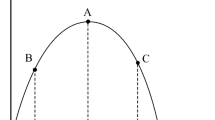Summary.
We show that it is sometimes efficient for a bank to commit to a policy that keeps information about its risky assets private. Our model, based upon Diamond-Dybvig (1983), has the feature that banks acquire information about their risky assets before depositors acquire it. A bank has the option of using contracts where the middle-period return on deposits is contingent on this information, but by doing so it must also reveal the information. We derive the conditions on depositors’ preferences and banking technology for which a bank would prefer to keep information secret even though it must then use a non-contingent deposit contract.
Similar content being viewed by others
Author information
Authors and Affiliations
Corresponding author
Additional information
Received: 5 November 2002, Revised: 19 December 2004,
JEL Classification Numbers:
D8, G21, G28.
I would like to thank an anonymous referee, Sudipto Bhattacharya, Ed Green, Chandra Kanodia, Andy McLennan, Arijit Mukherji, Bradley Ruffle, Neil Wallace, Warren Weber, and especially Nobu Kiyotaki for useful comments and suggestions.
Rights and permissions
About this article
Cite this article
Kaplan, T.R. Why banks should keep secrets. Economic Theory 27, 341–357 (2006). https://doi.org/10.1007/s00199-004-0597-y
Issue Date:
DOI: https://doi.org/10.1007/s00199-004-0597-y




